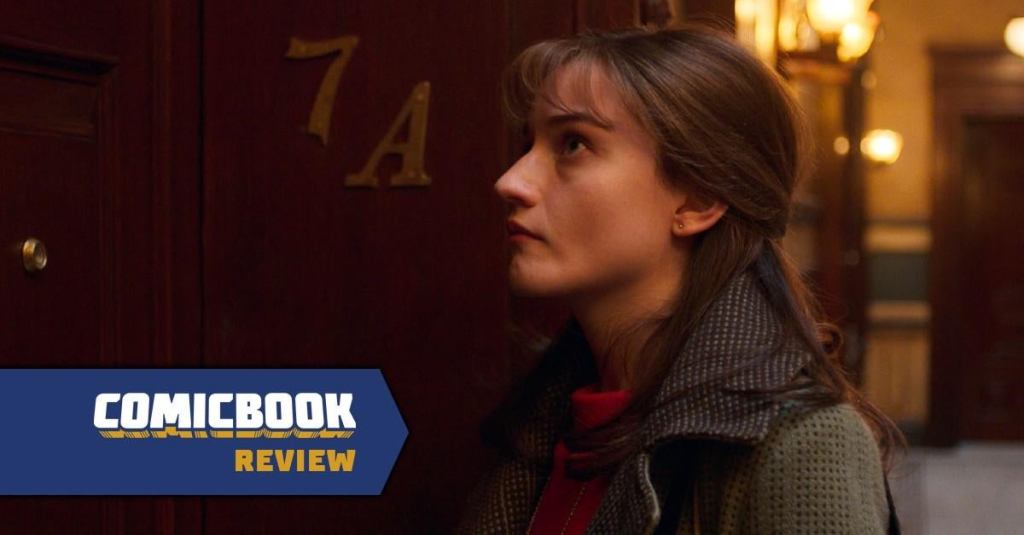Apartment 7A had a tough hill to climb even before it arrived, as the idea of “Rosemary’s Baby prequel movie” immediately sounds like a cash grab built on a bad idea. That’s what makes its strong start immediately disarming, as director Natalie Erika James’s take on the material kicks off and you can not only see she has her own ideas about this world, but is using the iconography of the original Rosemary’s Baby to try something new. In addition, there’s clearly money being put behind this, with actual period-era sets and costumes. The immediate confidence on display in the first half of Apartment 7A makes so many of the choices in the latter part so baffling, as if the movie is at war with itself about what it really should be.
Videos by ComicBook.com
Primetime Emmy Award-winner Julia Garner stars as Terry Gionoffrio in Apartment 7A, playing a character that Rosemary’s Baby viewers know well due to the handful of moments she has in the original movie. Her introduction in Apartment 7A is a lot like how she arrives in Roman Polanski’s movie (where she was played by Angela Dorian); she’s unassuming, casual, a working woman with a life and things to do. When her career as a professional dancer is totally derailed by an accident, it sends her down a desperate path, one where she falls prey to vices while also trying to crawl back up. One of the more powerful moments of the movie that encapsulates this is when Garner is faced with a condescending request from a major Broadway producer (Jim Sturgess), only to stand her ground and refuse his invitation to humiliate herself for his amusement. It becomes clear that this moment is the entire throughline of the movie.
Like all prequels, there is immediately something working against Apartment 7A: what viewers of the original movie already know. In this case, it’s which characters die, which ones have ulterior motives, and which places and people have a specific function. To its credit, Apartment 7A does not shy away from the fact that many people watching the film already know these things. So when Terry is befriended by Roman and Minnie Castevet (Kevin McNally and Dianne Wiest, respectively), we know what’s going on here, and very quickly are reminded that the facade of this nice elderly couple is just that. When they invite her to live in the titular apartment, we already know what is in store for her.
McNally and Wiest are a very charming addition to Apartment 7A and deliver two of the standout performances beyond Garner herself. Though Kevin McNally is perhaps best known for the Pirates of the Caribbean franchise, his ability to channel Sidney Blackmer’s entire look and mannerisms from the original Rosemary’s Baby are nothing short of remarkable. Wiest’s take on Minnie Castevet is certainly more her own than McNally’s portrayal, but given the larger-than-life personality of the character (which won Ruth Gordon an Oscar in the original movie), her work doesn’t feel too far off center.
Considering the legendary status that Rosemary’s Baby has on the whole, it might seem like climbing Everest to even attempt to match some of its ideas. One of the most unique sequences in Apartment 7A is a moment where it really embodies Garner’s lead character in a similar way to the original. Where Roman Polanski took Rosemary out onto a boat and the open sea for one of her early hallucinations, Julia Garner’s Terry takes on a major song and dance number. The scene is compelling not only from a character standpoint, but also visually, as her drug-induced haze gives way to a well-choreographed costume change and dance sequence, including big sets and surprise moments. It culminates into one of the best scares in the entire film, which keeps up the wicked production design but with, naturally, a bit of a satanic influence.
Another thing that really works in the favor of Apartment 7A‘s status as a prequel is that it doesn’t actively fall into the worst kinds of habits one might expect. There’s no on-the-nose moment that details why a specific something was done a certain way in Rosemary’s Baby, nor is anything actively disrupted to the point where now something “doesn’t make sense” in the original film. Naturally, there are some recurring motifs or imagery, and a familiar-looking pair of demonic hands appear in a crucial moment to deliver the best jump scare of the film, but so much of Apartment 7A really does feel like a daring and original take on the material.
That said, about an hour into the movie, there’s a pivot and Apartment 7A‘s descent into this wicked world becomes clumsy. It’s worth nothing that Apartment 7A is about 45 minutes shorter than Rosemary’s Baby. The original film gradually constructs its paranoia so that it builds to a fever pitch. Apartment 7A has no such luxury available to it, so the patience and meticulous unfolding found in Polanski’s film is forced to be repeated not only very quickly but without much of the nuance built into it. Rosemary unraveling the conspiracy around her feels earned and is well thought out, but Terry’s similar journey here feels like a committee decided “well, she should figure it out like the old movie!” This leads to a sizeable chunk of the movie where the spark has gone out and instead a list of things are being checked off. Luckily, the final scenes make up for this in spades with a moment deeply rooted in its main character.
Like the original Rosemary’s Baby, a pervasive theme throughout Apartment 7A is the larger political issue of a woman’s reproductive rights, but it manages to get deeper than just a surface-level take on the idea. It’s not just grappling with the larger play of someone trying to fight for themselves, but someone who is consistently being blocked at every turn by alleged wealthy and powerful people that “know better.” The movie is about a woman whose body and decisions have been taken from her; even as she tries to pilot through life, she knows there are roadblocks around every corner that won’t allow her to do what she wants. This is both literal and metaphorical for Julia Garner’s Terry, but also nearly all the young women in the movie. One moment has Dianne Wiest seemingly reflecting fondly on the young woman that stayed with them before Terry, calling her “a gifted young woman” with a lilt in her voice, only to immediately throw her final belonging into the trash with a pounding thud and without a second thought. It’s not subtle, but in today’s world, why should it be?
The real tragedy of Apartment 7A is that the film is being dumped onto streaming and not being given a proper theatrical release. Natalie Erika James’s film not only has unique ideas at play, but clearly had a lot of money put behind it. This isn’t a cynical attempt at retaining film rights like 2023’s Pet Sematary: Bloodlines and is instead an instance of a filmmaker having a confident idea that the studio seemed to support based on sheer production value alone. Even though some elements of Apartment 7A feel like they’re present for the sake of expectation, it’s a film that at least brings something different and new to the table, though at times the sacredness of the original movie is perhaps held onto a little too closely.

Rating: 3.5 out of 5
Apartment 7A lands on Paramount+ on September 27th.









